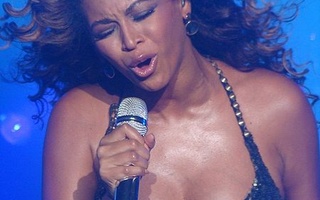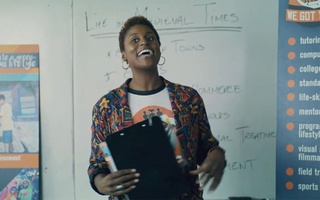{shortcode-515beac476730cf4059cfe58e7b50250949b1422}Like much of Beyoncé’s work, her new song “Formation” straddles the line between social commentary and music. What has been called her ode to blackness is an empowering anthem for a group that has historically been denied the opportunity to tell its story. The song uses evocatively black imagery to bring to the forefront Beyoncé's nuanced position at the nexus of black culture and white mainstream celebrity.
In the music video, Beyoncé is first shown sitting on a floating police car: the embodied form of tensions between police and the black community. And yet, within a few seconds, she is singing about a Givenchy dress. It is this cultural division, not only between affluence and poverty, but also between black and white, that Beyoncé must navigate in order to remain relevant. It is often this very division that has plagued Beyoncé’s image: Not black enough and she risks being seen as a sellout; too black and she risks losing her mainstream appeal.
In “Formation,” Beyoncé skillfully addresses this division—and even scorns its existence. When she sings “Y’all haters corny with that Illuminati mess,” she is expressing her ability to be simultaneously connected to her Southern roots while enjoying her ultra-celebrity status. Indeed, she proudly calls herself a “bama,” reclaiming the now-outdated racial slur which was once used to describe rural blacks. Beyonce also celebrates other aspects of blackness that are often seen as shameful, from afros to “Jackson five nostrils.” Compared to other songs that fetishize black physiques, Beyonce calls upon the cultural heritage that is encapsulated within the black body, giving it new meaning in pop culture.
In this video, the camera is not so much a controlling presence as it is a witness to the undeniable celebration of black culture. Beyonce stages black emancipation not for the white gaze, but in spite of it, a principle she took to new heights during her Superbowl performance. However, one of the reasons “Formation” is a phenomenon is because it capitalizes on Beyonce’s mainstream appeal. She has overcome the vetting process of white America; now she subverts the system with this undeniable proclamation of blackness.
And yet, how political can she truly be? Does she truly understand the struggle inherent in being poor and black? How much can she advocate for the marginalized from her position of privilege? This question of artistic sincerity is unanswerable, and could likely be endlessly debated. What is more important is that the audience listen carefully and respond actively to Beyoncé’s rallying call, afros and black berets included.
In listening to a song that is so inherently political, we as the audience have become complicit in its message. Beyonce is challenging us to give space for black artists to express their own experiences, on their own terms. In this case, the image of the black boy dancing in front of a line of police officers is one of artistic defiance. Absent the space for self-expression, he has carved out a niche for his own voice, an action that is perhaps the most political of all.
—Staff Writer Hanaa J. Masalmeh can be reached at hanaa.masalmeh@thecrimson.com.
Read more in Arts
'Wreck and Order' Unoriginal Yet WarmRecommended Articles
-
"Black Sea" Surfaces with Quality Acting"Black Sea" does not offer anything new, but it offers the old quite well: a stellar performance from Jude Law brings this submarine thriller safely to port.
-
SlayA lot of the time, Beyoncé is for everybody. Her music about feminism, love, and partying is for all women, and really for anyone. Her music about heartbreak is for the heartbroken. But what Beyoncé has done with “Formation” is momentous because in its rejoicing it is, unmistakably, by and for black people—especially for black femmes.
-
 She Hath Slayed
She Hath Slayed -
 ‘Insecure’ a Sure Bet to Make You Laugh
‘Insecure’ a Sure Bet to Make You Laugh -
Can Nicki Minaj Save the American Dream?There’s no one better than someone who has lived in poverty to critically, and empathetically, tackle the issue.













